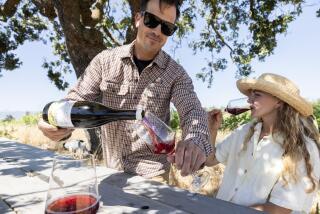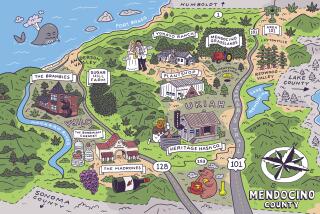Vintech Acquires Two Wineries
Vintech Wine Group, a fast-moving agricultural investment company based in Santa Rosa, has acquired two more California wineries including well-regarded Jekel Vineyards in Monterey County.
Vintech, which acquires wineries through a series of limited partnerships, said it paid just over $9 million for Jekel, which was founded in 1978, and $4.5 million for Mazzocco Vineyards, a Sonoma County winery founded in 1984.
Donald Bade, president of Vintech, said the two new wineries add important wines to those produced by two other Vintech properties, Lyeth and Laurier (formerly Domaine Laurier), both in Sonoma County.
Jekel, founded by Bill Jekel and his wife, Pat, is Vintechâs first property outside Sonoma County, and Bade said the acquisition is part of a company strategy.
âWe are trying to put together a portfolio of wine properties from all wine regions, from Santa Barbara to Mendocino, that are making wines that are true to those wine regions.â Bade said Vintech intends to add at least three more wineries in the near future.
Bill Jekel, 63, said he was saddened to have to sell the winery bearing his name, but âPat and I are living in Pismo Beach and itâs two hours north to the winery, and that makes it impossible to drive back and forth.
âSo when Iâm here, Iâm living in an apartment, and Pat and I have good health and the only thing we donât have is time together.â Moreover, son Rick Jekel, who had been the wine maker, left in 1988 to start his own vineyard and wasnât interested in operating the winery.
The deal includes 137 acres of vineyard, a 30,000-square foot winery and about 100,000 cases of inventory. Jekel retained his Sanctuary Vineyard, a 190-acre vineyard, but Vintech has a one-year option on it at a fixed price.
âThe business has changed tremendously over the last 10 years, and a key to it today is the marketing,â said Jekel. He said Vintechâs marketing plan, to link together a group of wineries from different areas, all with a premium image, makes a great deal of sense.
âOne of the things that induced me to do this (sell the winery) is that they will take the winery brand in the same direction I would have taken it, but with more marketing commitment than I could have done. Don intends to make a quality statement.â
Jekel can produce about 75,000 cases of wine, though it made only 60,000 cases last year. Bade said the goal is to bring the winery up to about 100,000 cases.
Bade said he and his staff tasted as many Monterey County wines as it could find, âand for a winery with national distribution and a good name, and high-quality wines, Jekel was the best,â he said. âThe wines help our product line, and it gives our marketing organization another layer.â
He said escrow would close in about three to five months.
The Mazzocco property was sold by Los Angeles eye surgeon Dr. Thomas Mazzocco, who had been flying his own plane to the winery.
Included in that sale were 17 acres at the winery in Dry Creek Valley, the 18-acre River Lane Vineyard in Geyserville and the winery and small inventory.
All Vintech acquisitions have been structured in the same way as limited partnerships, with partnership units selling for $25,000 each.
Bade said that at some point he intends to bring all the partnerships together into a publicly traded corporation. Some 40% of Vintech investors are invested in all winery ventures, he said.
Vintech, which made its early agricultural investments in almonds, moved from Marin County to Santa Rosa in 1986 and within a year had bought Lyeth. It acquired Domaine Laurier a year ago.
The state Supreme Court ruling last Monday that gave the Napa Valley Wine Train the apparent go-ahead to start unlimited service may not change anything immediately.
Thatâs the view of one of the foes of the train who helped write an agreement that Wine Train officials signed that binds the train to limited service.
Bob Phillips, owner of the Vine Hill Ranch and president of Alliance for an EIR on the Wine Train, said his group has an agreement with the Wine Train mandating temporary limited service pending completion of an environmental impact report. He said the agreement was signed in exchange for an agreement by Wine train officials to adhere to the terms of an environmental report.
The Supreme Court ruled Monday that the train didnât have to conform to Public Utility Comission environmental rules, but Phillips said the Wine Train has already agreed publicly to abide by the EIR, which is not yet completed.
âWe signed the settlement agreement for just whatâs happened--if the (court) decision went the way it went,â said Phillips. âWell, we still have this agreement in effect that says they will run primarily limited service, which is no more than three trains a day and no more than 15 a week and no one gets off en route. That is still in effect and the EIR will proceed.â
Phillips admitted Wine Train officials now may feel they may not have to adhere to the EIR, but he said, âThey have said in the past that whatever happens, they will adhere to whatever the EIR dictates, whether or not the PUC has control.â
He said an appeal to the U.S. Supreme Court on the issue is an option his group could pursue, âbut I donât really know. Our attorneys are talking to Wine Train attorneys right now.â
Jack McCormack, president of the Wine Train, was in meetings and unavailable for immediate comment on the court ruling.
More to Read
Inside the business of entertainment
The Wide Shot brings you news, analysis and insights on everything from streaming wars to production â and what it all means for the future.
You may occasionally receive promotional content from the Los Angeles Times.










